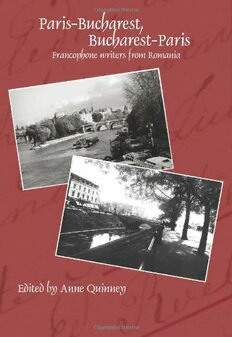
Paris-Bucharest, Bucharest-Paris: Francophone Writers from Romania PDF
Preview Paris-Bucharest, Bucharest-Paris: Francophone Writers from Romania
ft Paris-Bucharest, 367 Bucharest-Paris P a Francophone writers from Romania r i s - B u c h a r e s t , B u c h a r This collection of essays presents new research on the work of Romanian e writers who chose French as a literary language. Romanian is itself, of s course, a Romance language, and there is a long history of close Franco- t - Romanian ties. But given the complex and often multilingual cultural heritage P of these writers–whose infl uences included German, Russian, and Ottoman– a their contribution to French literature represents a unique hybrid form of r francophonie. And yet unlike the literary production of former French colonies, is this work has received little scholarly attention as a contribution to French literature. Th is book aims to rectify this situation. Focusing on the historical, cultural, and artistic links between France and Romania in the twentieth century from the standpoint of such fi gures as Tristan Tzara, Anna de Noailles, Panaït EEE ddd Istrati, Eugène Ionesco, Isidore Isou, and E.M. Cioran, the essays develop iii ttt innovative and insightful perspectives with regard to the work of individual eee ddd authors. Th e volume as a whole will thus serve to reshape prevailing conceptions of Francophone literary production and to expand fundamentally the conceptual bbb yyy boundaries of Francophone Studies. AAA nnn nnn eee QQQ uuu iii nnn nnn eee yyy Edited by Anne Quinney ISBN 978-90-420-3451-8 9 789042 034518 Paris-Bucharest, Bucharest-Paris FAUX TITRE 367 Etudes de langue et littérature françaises publiées sous la direction de Keith Busby, †M.J. Freeman, Sjef Houppermans et Paul Pelckmans Paris-Bucharest, Bucharest-Paris Francophone writers from Romania Edited by Anne Quinney AMSTERDAM - NEW YORK, NY 2012 Cover illustrations: Dambovita River, Bucharest (1924) and Ile de la Cité, Paris (1998). © www.pozeleonline.ro and Richard Quinney Cover design by Inge Baeten The paper on which this book is printed meets the requirements of ‘ISO 9706: 1994, Information and documentation - Paper for documents - Requirements for permanence’. Le papier sur lequel le présent ouvrage est imprimé remplit les prescriptions de ‘ISO 9706: 1994, Information et documentation - Papier pour documents - Prescriptions pour la permanence’. ISBN: 978-90-420-3451-8 E-Book ISBN: 978-94-012-0737-9 © Editions Rodopi B.V., Amsterdam - New York, NY 2012 Printed in The Netherlands Table of Contents Acknowledgments 9 Introduction 11 1. (cid:179)(cid:37)(cid:88)(cid:70)(cid:75)(cid:68)(cid:85)(cid:72)(cid:86)(cid:87)-on-the-(cid:54)(cid:72)(cid:76)(cid:81)(cid:72)(cid:180)(cid:29)(cid:3) The Anatomy of a National Obsession Monica Spiridon 23 2. The Orientalism of Anna de Noailles Ferdâ Asya 37 3. Before They Were Famous: Tristan Tzara, Nationhood, and Poetry Stephen Forcer 71 4. The Surrealist Group of Bucharest: Collective Works, 1945(cid:177)1947 Monique Yaari 95 5. The Trans-cultural Journey of Benjamin Fondane Monique Jutrin 137 6. French as the Language of Libre Échange in the Works of Panaït Istrati Catherine Rossi 161 7. Home Is Elsewhere: Exile in the Theatre of Ionesco Ingrid Chafee 173 8. Traditionalism and Protochronism in the European Context Ashby Crowder 197 9. (cid:44)(cid:86)(cid:76)(cid:71)(cid:82)(cid:85)(cid:72)(cid:3)(cid:44)(cid:86)(cid:82)(cid:88)(cid:182)(cid:86)(cid:3)(cid:54)(cid:83)(cid:76)(cid:85)(cid:76)(cid:87)(cid:72)(cid:71)(cid:3)(cid:47)(cid:72)(cid:87)(cid:87)(cid:72)(cid:85)(cid:86) Jean-Jacques Thomas 225 10. Emile Cioran and the Politics of Exile Anne Quinney 253 Notes on Contributors 283 List of Illustrations Figure 4.1. Gherasim Luca and Trost, Dialectique de la dialectique. Cover. 107 Figure 4.2. Gherasim Luca and Trost, Présentation de graphies colorées, de (cid:70)(cid:88)(cid:69)(cid:82)(cid:80)(cid:68)(cid:81)(cid:76)(cid:72)(cid:86)(cid:3)(cid:72)(cid:87)(cid:3)(cid:71)(cid:182)(cid:82)(cid:69)(cid:77)(cid:72)(cid:87)(cid:86)(cid:17)(cid:3)Cover. 107 Figure 4.3. Gherasim Luca, Tenter (cid:79)(cid:182)(cid:76)(cid:80)(cid:83)(cid:82)(cid:86)(cid:86)(cid:76)(cid:69)(cid:79)(cid:72)(cid:3)(cid:11)(cid:70)(cid:88)(cid:69)(cid:82)(cid:80)(cid:68)(cid:81)(cid:76)(cid:72)(cid:12)(cid:17) Présentation de graphies colorées, de cubomanies et (cid:71)(cid:182)(cid:82)(cid:69)(cid:77)(cid:72)(cid:87)(cid:86)(cid:17) Illustration. 108 Figure 4.4. Trost, Mouvement relatif-absolu (vaporisation). Présentation de graphies colorées, de cubomanies et (cid:71)(cid:182)(cid:82)(cid:69)(cid:77)(cid:72)(cid:87)(cid:86)(cid:17)(cid:3)Illustration. 108 Figure 4.5. (cid:40)(cid:91)(cid:83)(cid:82)(cid:93)(cid:76)(cid:288)(cid:76)(cid:68)(cid:3)(cid:71)(cid:72)(cid:3)(cid:71)(cid:72)(cid:86)(cid:72)(cid:81)(cid:72)(cid:3)(cid:51)(cid:68)(cid:88)(cid:79)(cid:3)(cid:51)(cid:259)(cid:88)(cid:81)(cid:17) Flier. 111 Figure 4.6. Paul Paon, pen-and-ink drawing, untitled, 1943, signed PP 43. 112 Figure 4.7. Gherasim Luca, Gellu Naum, (cid:51)(cid:68)(cid:88)(cid:79)(cid:3)(cid:51)(cid:259)(cid:88)(cid:81)(cid:15)(cid:3)(cid:57)(cid:76)(cid:85)(cid:74)(cid:76)(cid:79)(cid:3)(cid:55)(cid:72)(cid:82)(cid:71)(cid:82)(cid:85)(cid:72)(cid:86)(cid:70)(cid:82)(cid:88)(cid:15)(cid:3)(cid:55)(cid:85)(cid:82)(cid:86)(cid:87)(cid:15) (cid:47)(cid:182)(cid:44)(cid:81)(cid:73)(cid:85)(cid:68)-N(cid:82)(cid:76)(cid:85)(cid:29)(cid:3)(cid:83)(cid:85)(cid:112)(cid:79)(cid:76)(cid:80)(cid:76)(cid:81)(cid:68)(cid:76)(cid:85)(cid:72)(cid:86)(cid:3)(cid:62)(cid:171)(cid:64). Cover. 113 Figure 4.8. Gherasim Luca, Gellu Naum, (cid:51)(cid:68)(cid:88)(cid:79)(cid:3)(cid:51)(cid:259)(cid:88)(cid:81)(cid:15)(cid:3)(cid:57)(cid:76)(cid:85)(cid:74)(cid:76)(cid:79) Teodorescou, Trost, (cid:47)(cid:182)(cid:44)(cid:81)(cid:73)(cid:85)(cid:68)(cid:3)(cid:49)(cid:82)(cid:76)(cid:85)(cid:29)(cid:3)(cid:83)(cid:85)(cid:112)(cid:79)(cid:76)(cid:80)(cid:76)(cid:81)(cid:68)(cid:76)(cid:85)(cid:72)(cid:86)(cid:3)(cid:62)(cid:171)(cid:64)(cid:17) Signature page. 113 Figure 9.1. Isou, Les Journaux des Dieux. 230 Figure 9.2. Schwitters, (cid:179)Poème sans titre,(cid:180) 1923. 241 Figure 9.3. Isou, (cid:179)Larmes de jeune fille(cid:177)poème clos(cid:180) ((cid:47)(cid:182)(cid:36)(cid:74)(cid:85)(cid:112)(cid:74)(cid:68)(cid:87)(cid:76)(cid:82)(cid:81)). 241 Figure 9.4. Isou, (cid:179)Larmes de jeune fille(cid:177)poème clos(cid:180) ((cid:47)(cid:182)(cid:36)(cid:74)(cid:85)(cid:112)(cid:74)(cid:68)(cid:87)(cid:76)(cid:82)(cid:81)). 242 Figure 9.5. Isou, (cid:179)(cid:20)(cid:113)(cid:85)(cid:72)(cid:3)(cid:86)(cid:92)(cid:80)(cid:83)(cid:75)(cid:82)(cid:81)(cid:76)(cid:72)(cid:180) ((cid:47)(cid:182)(cid:36)(cid:74)(cid:85)(cid:112)(cid:74)(cid:68)(cid:87)(cid:76)(cid:82)(cid:81)). 243 Figure 9.6. Isou, Self-portrait, 1952. 245 Figure 9.7. Isou wandering at Saint-Germain-des-prés in (cid:55)(cid:85)(cid:68)(cid:76)(cid:87)(cid:112)(cid:3)(cid:71)(cid:72)(cid:3)(cid:69)(cid:68)(cid:89)(cid:72)(cid:3)(cid:72)(cid:87)(cid:3)(cid:71)(cid:182)(cid:112)(cid:87)(cid:72)(cid:85)(cid:81)(cid:76)(cid:87)(cid:112), 1951. 246 Figure 9.8. (cid:179)(cid:39)(cid:112)(cid:87)(cid:82)(cid:88)(cid:85)(cid:81)(cid:72)(cid:80)(cid:72)(cid:81)(cid:87)(cid:180)(cid:3)(cid:82)(cid:73)(cid:3)(cid:68)(cid:3)(cid:80)(cid:76)(cid:79)(cid:76)(cid:87)(cid:68)(cid:85)(cid:92)(cid:3)(cid:70)(cid:72)(cid:85)(cid:72)(cid:80)(cid:82)(cid:81)(cid:92)(cid:3) (cid:76)(cid:81)(cid:3)(cid:41)(cid:85)(cid:72)(cid:81)(cid:70)(cid:75)(cid:3)(cid:44)(cid:81)(cid:71)(cid:82)(cid:70)(cid:75)(cid:76)(cid:81)(cid:68)(cid:3)(cid:68)(cid:81)(cid:71)(cid:3)(cid:179)(cid:70)(cid:75)(cid:76)(cid:86)(cid:72)(cid:79)(cid:76)(cid:81)(cid:74)(cid:180)(cid:3)(cid:76)(cid:81)(cid:3)(cid:87)(cid:75)(cid:72)(cid:3)(cid:73)(cid:76)(cid:79)(cid:80)(cid:3)(cid:86)(cid:87)(cid:82)(cid:70)(cid:78)(cid:3) in Traité de (cid:69)(cid:68)(cid:89)(cid:72)(cid:3)(cid:72)(cid:87)(cid:3)(cid:71)(cid:182)(cid:112)(cid:87)(cid:72)(cid:85)(cid:81)(cid:76)(cid:87)(cid:112), 1951. 247 Figure 9.9. French poetic evolution since Baudelaire according to Isou ((cid:47)(cid:182)(cid:36)(cid:74)(cid:85)(cid:112)(cid:74)(cid:68)(cid:87)(cid:76)(cid:82)(cid:81)). 249 Acknowledgments I would like to thank the Department of Modern Languages and the Office of Research and Sponsored Programs at the University of Mississippi for supporting this project financially since its inception. Departmental chair and editor of Balkanistika, Donald Dyer, deserves special recognition for offering his editorial skills and his expertise in the area of Romanian scholarship, as well as for suggesting certain members of this community of scholars now represented together in this volume. Several individuals were also instrumental in the initial conception and ultimate completion of this book. Contributor Monique Yaari offered her vision and insight into the phenomenon of Romanian Francophonia and helped define this project in numerous ways as it shifted and changed its ideological, geographical, and his- torical range over the last decade. Doina Pasca Harsanyi and Nicolae Harsanyi provided excellent guidance in regard to the subject in gen- eral and generously shared their first-hand knowledge and apprecia- tion of Romanian Francophilia on many occasions over the years. I speak for all the authors of this work in expressing gratitude to our copy editor, Nicola McCarthy, who painstakingly read and re-read, corrected, formatted, and proofread this manuscript written by ten dif- ferent authors in six different countries and in French, English, and Romanian. Christa Stevens at Rodopi was especially helpful in all matters related to publishing a multi-authored book. Finally, I am in- debted to each of the contributors for their excellent work, enthusiasm, and patience as our collaborative efforts evolved to produce this unique volume.
